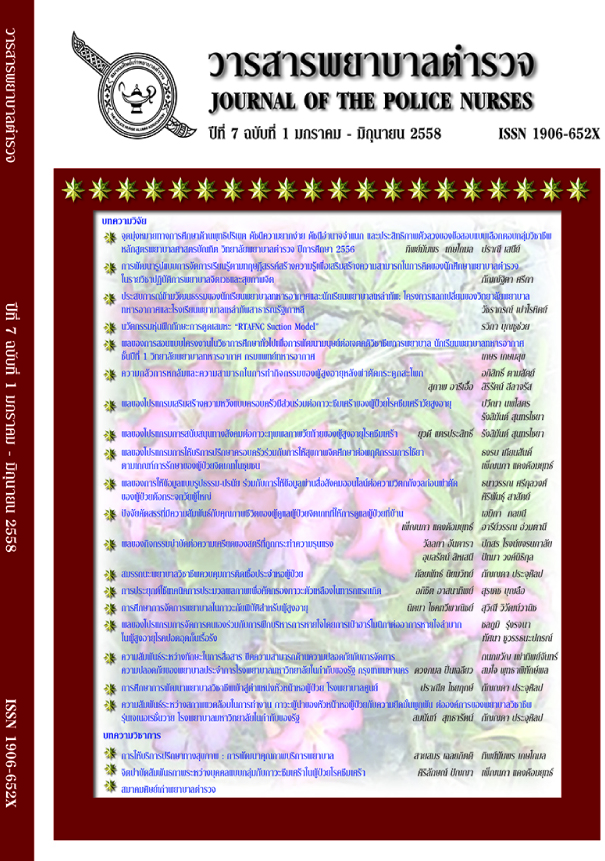ผลของโปรแกรมเสริมสร้างความหวังแบบครอบครัวมีส่วนร่วมต่อภาวะซึมเศร้าของผู้ป่วยโรคซึมเศร้าวัยสูงอายุ
Keywords:
ภาวะซึมเศร้า, โปรแกรมเสริมสร้างความหวัง, ครอบครัวมีส่วนร่วม, Depression, The hope enhancement program, Family participationAbstract
การวิจัยกึ่งทดลองครั้งนี้มีวัตถุประสงค์เพื่อเปรียบเทียบภาวะซึมเศร้าของผู้ป่วยโรคซึมเศร้าวัยสูงอายุที่ได้รับโปรแกรมเสริมสร้างความหวังแบบครอบครัวมีส่วนร่วม ก่อน-หลัง และระยะติดตามผลกับกลุ่มที่ได้รับการพยาบาลตามปกติ ตัวอย่างคือ ผู้ป่วยโรคซึมเศร้าวัยสูงอายุที่มีอายุ 60 ปีบริบูรณ์ขึ้นไปและสมาชิกครอบครัวจำนวน 40 คน (คู่) คัดเลือกแบบเจาะจงตามเกณฑ์คุณสมบัติ จากผู้ป่วยโรคซึมเศร้าที่มารับบริการ ณ แผนกผู้ป่วยนอกของโรงพยาบาลชุมชนและโรงพยาบาลทั่วไป แบ่งกลุ่มโดยวิธีจับคู่ตัวอย่างเพื่อควบคุมตัวแปรแทรกซ้อนแบ่งเป็นกลุ่มทดลอง และกลุ่มควบคุมกลุ่มละ 20 คน (คู่)
กลุ่มทดลองได้รับโปรแกรมเสริมสร้างความหวังแบบครอบครัวมีส่วนร่วมเป็นเวลา 3 สัปดาห์ ซึ่งสร้างขึ้นตามกรอบแนวคิดทฤษฏีแนวทางการบำ บัดด้วยความหวังของ Snyder (1994) ได้ผ่านการตรวจสอบความตรงตามเนื้อหาจากผู้ทรงคุณวุฒิทางด้านสุขภาพจิตและจิตเวช จำนวน 5 ท่าน และกลุ่มควบคุมได้รับการพยาบาลตามปกติเครื่องมือที่ใช้ในการเก็บข้อมูลประกอบด้วย 1) แบบทดสอบสภาพสมองเบื้องต้นฉบับภาษาไทย (MMSE – Thai
2002) 2) แบบวัดความเศร้าในผู้สูงอายุไทย (TGDS) และ 3) แบบวัดความหวังสำหรับผู้ป่วยโรคซึมเศร้า วิเคราะห์ความเที่ยงของเครื่องมือ โดยใช้สูตรคูเดอร์ ริชาร์ดสันและหาค่าสัมประสิทธิ์แอลฟาของครอนบาค ได้ค่าความเที่ยงของแบบทดสอบและแบบวัด เท่ากับ 0.89, 0.90 และ 0.87 ตามลำดับ วิเคราะห์ข้อมูลด้วยสถิติเชิงบรรยายสถิติการทดสอบทีสำหรับตัวอย่างที่เป็นอิสระต่อกัน การวิเคราะห์ความแปรปรวนแบบวัดซ้ำ และการทดสอบรายคู่ด้วยวิธีของนิวแมน-คูลส์ ผลการวิจัยพบว่า คะแนนเฉลี่ยภาวะซึมเศร้ากลุ่มทดลองและกลุ่มควบคุมหลังการทดลองและระยะติดตาม 2 สัปดาห์แตกต่างกันอย่างมีนัยสำคัญทางสถิติ (p<.05) ในกลุ่มทดลองพบว่า คะแนนเฉลี่ยภาวะซึมเศร้า ก่อนการทดลอง ( = 18.75, S.D. = 4.35) หลังการทดลอง (
= 15.50, S.D. = 2.98) และระยะ
ติดตาม 2 สัปดาห์ ( = 14.35, S.D. = 2.52) แตกต่างกันอย่างมีนัยสำคัญทางสถิติ (p<.05) ส่วนคะแนนเฉลี่ยภาวะซึมเศร้าหลังการทดลอง (
= 15.50, S.D. = 2.98) และระยะติดตามผล 2 สัปดาห์ (
= 14.35, S.D. = 2.52) ไม่แตกต่างกัน (p>.05) โปรแกรมเสริมสร้างความหวังแบบครอบครัวมีส่วนร่วมช่วยลดภาวะซึมเศร้าของผู้ป่วยโรคซึมเศร้าวัยสูงอายุได้ ดังนั้นพยาบาลจิตเวชควรนำโปรแกรมเสริมสร้างความหวังแบบครอบครัวมีส่วนร่วมนี้ไปประยุกต์ใช้เพื่อลดภาวะซึมเศร้าในผู้ป่วยจิตเวชอื่นๆ
The Effect of Hope Enhancement Program with Family Participation on Depression of Older Persons with Major Depressive Disorders.
Abstract
The purpose of this quasi-experimental study was to compare depression of older person after receiving the hope enhancement with family participation program before the group pre-posttest and follow up. The sample included forty older persons, age 60 years and older, whose diagnosed as depressive disorder and their families, were recruited from the outpatient department. The potential subjects, were assigned by matching to the experimental and the control group, 20 subjects in each group.
The experimental group received the hope enhancement program with family participation for three weeks, while the control group received nursing care as usual. The concepts of hope therapy protocol by Snyder (1994) were derived into the program and validate for content validity by five professional experts. The instrument employed in data collection included 1) Mini Mental State Examination – Thai 2002, 2) Thai Geriatric Depression Scale (TGDS) and 3) The Hope Questionnaire. The Kuder – Richardson Reliability and Chronbach’s Alpha coefficient reliability of the questionnaire for instruments were 0.89, 0.90 and 0.87, respectively. Data were analyzed by descriptive statics, independent t-test, repeated ANOVA, and Newman-Keuls method. The results revealed that the mean scores of depression in the experimental and control groups after the experiment and two week follow-up were significantly different (p < .05). In the experiment group, the mean scores of depression before the experiment ( = 18.75, S.D. = 4.35), after the experiment (
= 15.50, S.D. = 2.98), and two week follow-up (
= 14.35, S.D. = 2.52) were significantly different (p < .05). However, the mean scores of depression in the experiment group after the experiment and two week follow-up were not significantly different (p >.05). The hope enhancement program with family participation used in this study was found to be effectively reduced depression on older persons with major depressive disorder. Thus, health care providers, particularly psychiatric nurses, could apply this program to reduce depression in other psychiatric patient.
Downloads
Downloads
Published
How to Cite
Issue
Section
License
ผลงานที่ได้ตีพิมพ์แล้วจะเป็นลิขสิทธิ์ของวารสารพยาบาลตำรวจ















